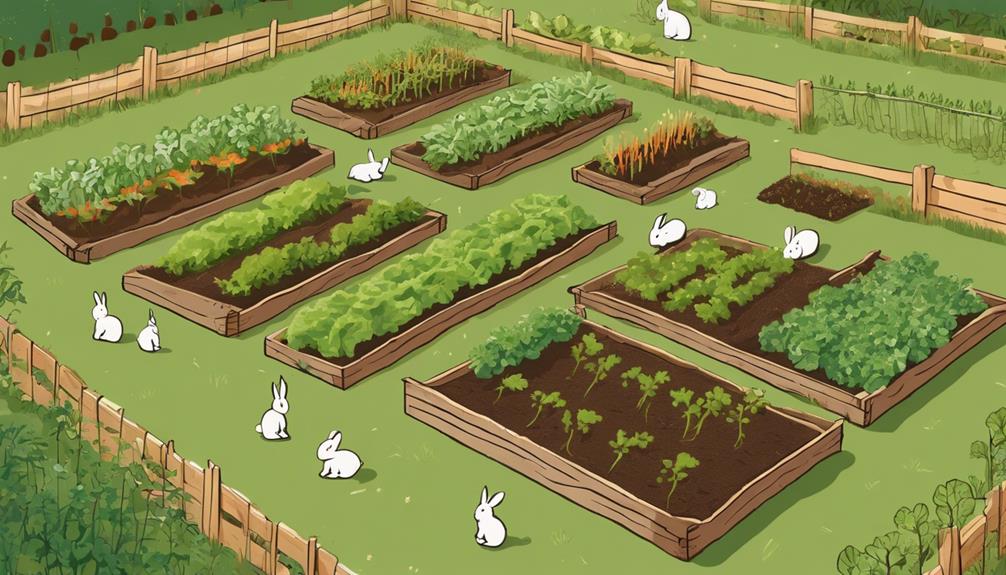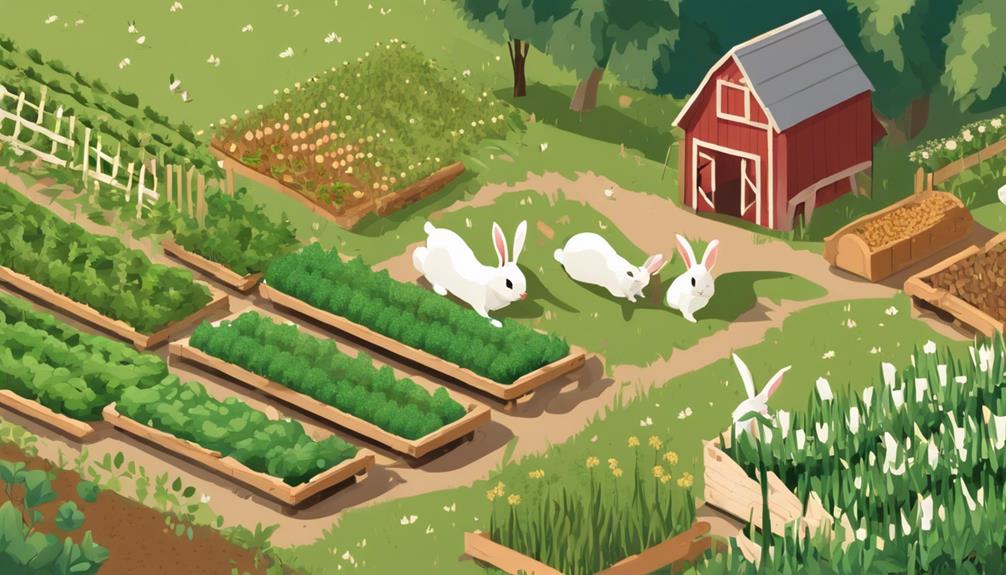10 Tips for Integrating Rabbits Into Small-Scale Agriculture
Integrating rabbits into small-scale agriculture can boost sustainability and productivity. Start by selecting adaptable and docile breeds for easy handling. Provide well-ventilated housing with nesting essentials and predator protection. Design a diet of hay, veggies, and limited pellets for optimal health. Prioritize preventive healthcare and strict biosecurity measures. Incorporate rabbits in crop rotation for soil fertility and pest management benefits. Use rabbit manure as fertilizer to enrich soil health. Leverage rabbits for natural pest control without chemicals. Efficiently market rabbit products for broader exposure. Enhancing small-scale agriculture with rabbits offers a range of benefits waiting to be explored further.
Choosing the Right Rabbit Breeds
When selecting rabbit breeds for small-scale agriculture, prioritize those known for their adaptability to various climates and ease of handling. Breed selection plays a crucial role in the success of your rabbit farming venture. Consider temperament when choosing breeds, as this will impact how easy they're to handle and work with on a daily basis. Opt for breeds known for being docile and friendly, especially if you're new to rabbit farming.
Genetic diversity is another key factor to bear in mind. Aim for a mix of breeds to increase genetic diversity within your rabbitry. This can help enhance the overall health and resilience of your rabbits, making them less susceptible to diseases and environmental stressors. When planning your breeding strategies, focus on maintaining a balance between preserving desirable traits and promoting genetic variation.
Some popular rabbit breeds for small-scale agriculture include the New Zealand White, Californian, and Dutch rabbits. These breeds are known for their adaptability to different climates, ease of handling, and good reproductive performance. By incorporating a mix of these breeds into your rabbitry, you can benefit from their diverse characteristics and create a robust and thriving farming operation. Remember to research each breed thoroughly to ensure they align with your specific farming goals and environmental conditions.
Providing Suitable Housing
To ensure the well-being and optimal performance of your rabbits in small-scale agriculture, providing suitable housing is paramount. When setting up housing for your rabbits, consider nesting essentials and ventilation solutions. Rabbits require a cozy and secure space to retreat, especially during the breeding season. Provide nesting boxes filled with soft hay or straw to accommodate their natural burrowing instincts and keep them comfortable. Ensure good ventilation within the housing structure to prevent heat stress and maintain air quality.
Space optimization is crucial when designing rabbit housing. Each rabbit should have ample room to move around, stretch, and exhibit natural behaviors. Consider multi-level housing or spacious pens to maximize space utilization while promoting exercise and mental stimulation for your rabbits. Additionally, predator protection is essential to safeguard your rabbits from potential harm. Implement sturdy fencing, wire mesh, or predator-proof housing to prevent attacks from predators such as foxes, raccoons, or birds of prey.
Designing a Balanced Diet
Ensuring that your rabbits have a balanced diet is essential for their overall health and well-being on your small-scale agricultural operation. To meet their nutritional requirements, consider establishing feeding schedules that align with their foraging habits and natural diet. Rabbits are herbivores, so their diet should primarily consist of hay, fresh vegetables, and a limited amount of pellets.
It's crucial to provide unlimited access to fresh, high-quality hay, such as timothy or grass hay, which is essential for their digestive health. Additionally, include a variety of leafy greens like kale, parsley, and spinach to offer important vitamins and minerals. Introduce new vegetables gradually to prevent digestive issues, and always wash them thoroughly to remove any pesticides.
Pellets should only make up a small portion of their diet, as they're dense in calories and can lead to obesity if overfed. Select high-fiber pellets specifically formulated for rabbits to ensure they're getting the necessary nutrients. Offer pellets in moderation, about 1/4 cup per 6 pounds of body weight per day, and adjust based on your rabbits' individual needs.
Ensuring Proper Healthcare
How can you maintain the health of your rabbits on your small-scale agricultural operation? Ensuring proper healthcare for your rabbits is crucial to their overall well-being and productivity. Here are some essential tips to help you keep your rabbits healthy:
- Preventive Medicine: Regular check-ups by a veterinarian can help prevent potential health issues before they arise. Vaccinations, parasite control, and proper nutrition are key components of preventive care. By staying proactive, you can save both time and money in the long run.
- Observation: Monitor your rabbits closely for any signs of illness or distress. Changes in behavior, appetite, or waste output can indicate a health problem. Early detection allows for prompt intervention, increasing the chances of successful treatment.
- Proper Housing and Hygiene: Maintain clean and well-ventilated living quarters for your rabbits. Dirty environments can lead to various health issues, including respiratory infections and parasitic infestations. Regularly clean cages, provide fresh bedding, and ensure proper waste disposal.
- Emergency Care: Have a basic understanding of common rabbit health emergencies and how to respond. Keep essential supplies on hand, such as a first aid kit, contact information for a rabbit-savvy veterinarian, and knowledge of basic first aid procedures. Being prepared can make a significant difference in critical situations.
Implementing Biosecurity Measures
Maintain a strict biosecurity protocol to safeguard the health of your rabbits and prevent the spread of diseases on your small-scale agricultural operation. Disease prevention is crucial in maintaining a healthy rabbit herd. Implement quarantine protocols for any new rabbits entering your farm. This helps prevent the introduction of diseases from outside sources. Quarantine new rabbits for at least 30 days before introducing them to the rest of your herd. During this time, observe them for any signs of illness.
When designing your farm layout, consider biosecurity zones. Create separate zones for different activities such as feeding, breeding, and medical care. This helps reduce the risk of disease transmission between different areas. It's essential to establish clear pathways and entry points to each zone to minimize cross-contamination.
Regularly clean and disinfect equipment, tools, and surfaces to prevent the spread of diseases. Implement strict hygiene practices, such as washing hands and wearing clean clothing and boots when handling rabbits. Additionally, limit visitors to your farm, especially those who've been in contact with other rabbits.
Managing Rabbit Reproduction
To effectively manage rabbit reproduction in your small-scale agricultural operation, establish a breeding schedule that aligns with your production goals and resources. Here are some key points to consider when managing rabbit reproduction:
- Breeding Practices: Implement controlled breeding practices to ensure the health and welfare of your rabbits. Avoid overbreeding females as it can lead to health issues and decreased reproductive success. Monitor mating closely to prevent aggression between rabbits.
- Genetic Diversity: Maintain genetic diversity within your rabbit population by carefully selecting breeding pairs. Avoid inbreeding by keeping track of the lineage of your rabbits. This helps prevent genetic disorders and promotes overall vitality in the offspring.
- Welfare Considerations: Prioritize the welfare of your rabbits throughout the breeding process. Provide adequate housing, nutrition, and veterinary care to support healthy reproduction. Regularly assess the conditions of your rabbits and make adjustments as needed to ensure their well-being.
- Monitoring and Record-Keeping: Keep detailed records of breeding dates, litter sizes, and any relevant health information. Monitoring the reproductive performance of your rabbits allows you to make informed decisions about future breeding practices. Record-keeping also helps track genetic lineage and identify any trends that may impact your breeding program.
Incorporating Rabbits in Crop Rotation

Incorporating rabbits into crop rotation enhances soil fertility and pest management in small-scale agricultural systems. These furry helpers can play a crucial role in sustainable practices by enriching the soil with their droppings. Rabbit manure is high in nitrogen, phosphorus, and potassium, making it an excellent natural fertilizer for crops.
When integrating rabbits into crop rotation, consider companion planting to further enhance the benefits. Certain plants attract beneficial insects that can help control pests naturally, reducing the need for harmful chemicals. For example, planting marigolds alongside rabbit-grazed areas can deter pests like nematodes while providing a colorful addition to your agricultural landscape.
Rabbits can be rotated through different sections of the farm, following the crop rotation schedule. This allows them to graze on cover crops or weeds in fallow fields, clearing the land for the next planting season. As they munch on vegetation, they naturally fertilize the soil, promoting healthier plant growth in the long run.
Incorporating rabbits in crop rotation not only benefits the soil but also creates a more balanced and sustainable farming system. By harnessing their natural behaviors and pairing them with strategic planting methods, you can maximize soil enrichment and pest control while minimizing environmental impact.
Utilizing Rabbit Manure as Fertilizer
Enhance your small-scale agricultural practices by utilizing rabbit manure as a natural and nutrient-rich fertilizer for your crops. Rabbit manure is a valuable resource that can significantly benefit your soil health and plant growth. Here are some practical tips for effectively using rabbit manure in your agricultural endeavors:
- Composting Benefits: Rabbit manure is a fantastic addition to your compost pile. Its high nitrogen content helps speed up the decomposition process and enrich the compost with essential nutrients. Mix rabbit manure with other organic materials like straw, leaves, and kitchen scraps to create a nutrient-dense compost that can be used to feed your plants.
- Soil Enrichment: When used directly as a fertilizer, rabbit manure can improve soil structure and fertility. Its balanced composition of nitrogen, phosphorus, and potassium makes it an excellent organic fertilizer for a wide variety of crops. Spread rabbit manure around your plants, mix it into the soil before planting, or brew it into a manure tea for a potent liquid fertilizer.
- Nutrient Retention: Rabbit manure releases nutrients slowly, providing long-lasting benefits to your plants. This slow-release characteristic helps prevent nutrient leaching and ensures that your crops receive a steady supply of essential elements throughout their growth cycle.
- Microbial Activity: Rabbit manure is rich in beneficial microbes that contribute to soil health. These microorganisms help break down organic matter, improve nutrient uptake by plants, and enhance overall soil biodiversity. Incorporating rabbit manure into your agricultural practices can promote a thriving soil ecosystem that supports robust plant growth.
Integrating Rabbits in Pest Control

Leveraging the natural instincts of rabbits can be a strategic method for controlling pests in your agricultural setting. Rabbits are natural predators to many insects and small rodents that can damage crops. By introducing rabbits into your farm, you can create a natural pest management system that's both effective and environmentally friendly.
In organic farming, where the use of chemical pesticides is limited, integrating rabbits in pest control is especially valuable. Rabbits can help keep pest populations in check without the need for harmful chemicals. This aligns with sustainable practices, promoting a healthier ecosystem within your farm.
To maximize the effectiveness of rabbits in pest control, consider strategically placing their housing near areas prone to pest infestations. This way, the rabbits can naturally deter pests from approaching sensitive crops. Additionally, rotating the rabbits between different sections of your farm can ensure comprehensive pest management across all areas.
It's essential to provide the rabbits with a balanced diet to maintain their health and hunting capabilities. Supplement their diet with fresh greens and vegetables to keep them active and engaged in pest control. By incorporating rabbits into your pest management strategy, you can enhance the overall sustainability and productivity of your small-scale agricultural operation.
Marketing Rabbit Products Efficiently
To effectively market rabbit products, understanding your target audience's preferences and needs is crucial for successful sales. Whether you're selling rabbit meat, fur, or even manure, here are some practical tips to help you efficiently market your rabbit products:
- Online Promotion: Utilize social media platforms and online marketplaces to showcase your rabbit products. Engage with potential customers through captivating content and high-quality images to attract their attention.
- Collaborating with Chefs: Partnering with local chefs to feature your rabbit meat in their dishes can help increase visibility and demand for your products. Collaborate with chefs to create unique recipes that highlight the quality and taste of your rabbit meat.
- Local Events: Participate in farmers' markets, food fairs, and other local events to introduce your rabbit products to the community. Offer samples, promotional discounts, and educational materials to attract customers and build relationships.
- Subscription Boxes: Consider partnering with subscription box services that focus on sustainable and ethically sourced products. Including your rabbit products in these boxes can expose your brand to a broader audience and create recurring sales opportunities.
Frequently Asked Questions
How Can I Prevent Rabbits From Damaging My Crops?
To prevent rabbits from damaging your crops, rabbit fencing and deterrence methods are essential. Additionally, consider implementing crop rotation and companion planting techniques.
Rabbit fencing creates a physical barrier, while deterrence methods like scent deterrents can help keep them away. Crop rotation disrupts their feeding patterns, and companion planting can confuse and deter rabbits.
What Are the Best Practices for Handling Aggressive Rabbits?
When dealing with aggressive rabbits, it's important to understand their behavior and use proper training techniques. Start by identifying the root cause of the aggression, whether it's fear, territoriality, or something else.
Establish boundaries and consistently enforce them to show the rabbit who's in charge. Positive reinforcement through treats and praise can also help in shaping their behavior.
With patience and persistence, you can effectively manage and train aggressive rabbits.
Can Rabbits Be Trained to Perform Specific Tasks on the Farm?
Yes, rabbits can be trained to perform specific tasks on the farm through behavior modification and training techniques.
By using positive reinforcement and repetition, you can enhance their productivity by teaching them to do tasks like coming when called, navigating obstacle courses, or even carrying small items.
With patience and consistency, rabbits can learn to be helpful partners in completing various farm tasks.
Are There Any Legal Regulations Related to Raising Rabbits on a Small-Scale Farm?
To ensure regulatory compliance when raising rabbits on a small-scale farm, it's crucial to be aware of zoning laws that may dictate where and how you can keep your rabbits.
These laws vary by location, so research your local regulations to avoid any legal issues.
What Are Some Creative Ways to Utilize Rabbit By-Products on the Farm?
When thinking about creative ways to utilize rabbit by-products on the farm, you can explore various options.
Rabbit droppings make excellent composting fertilizer, enriching the soil for your crops.
Additionally, if you have Angora rabbits, their wool can be harvested for wool production.
Conclusion
In conclusion, integrating rabbits into small-scale agriculture can be a rewarding and sustainable practice. By choosing the right breeds, providing proper housing and nutrition, and implementing biosecurity measures, you can ensure the health and productivity of your rabbits.
Utilizing rabbit manure as fertilizer, incorporating them into crop rotation, and using them for pest control can also benefit your farm. With efficient marketing strategies, you can make the most out of your rabbit products and enhance your agricultural operations.
